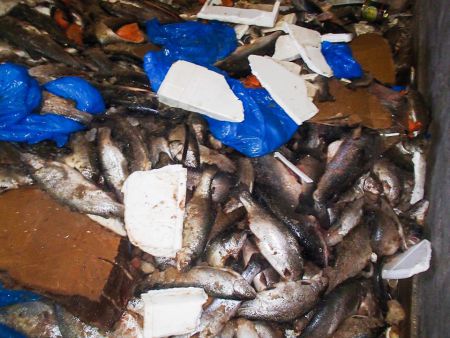With 10 councilors on board and only nine votes needed to veto HRM’s plan to shut down Otter Lake's waste managment facilities, the future of the town dump is still in the air.
Residents believe that closure of the facilities will have severe environmental impacts and breaks a promise made to the community when the landfill was first created.
Members of the Halifax Waste Resource Society gathered with councilors and concerned residents at Exhibition Park on November 28th for an update on what’s about to come.
“We are in the best position we’ve been in since this whole process started,” says Councilor Stephen Adams of district 11, comprised of Spryfield, Sambro Loop and Prospect road.
“We’re already ahead of the game. If we just continue the way were working now … we should have an early Christmas present,” says Adams, referring to the community’s crusade against HRM’s new garbage agenda.
HRM is proposing to shutdown Otter Lake Landfill facilities that reduce the amount of recyclables that wind up in the landfill. These facilities also process garbage into a grey matter that moderates odour and attracts fewer animals.
Out of the 140 000 tonnes of waste the Front end processing system received in 2011, 300 tones of recyclables (0.2 per cent of incoming trash) were diverted from entering the landfill.
With a price tag of $26,000 per tonne, or $7.8 million for the year, HRM is calling the system costly and inefficient.
Another proposal is to raise the landfill’s height by 15 meters, which could extend its life by 25 years — a move which will save tens of millions in the long run.
But as the hundred people who gathered for last week’s meeting demonstrate, most eyes aren’t on the money.
“We’re talking about the single biggest investment of our lives and that’s our homes, our families, our property and our environment,” said Bob Guthrie, a board member on the Halifax Waste Resource Society.
Councilor Reg Rankin shared a similar view: “there’s too many politicians who know the price of a lot of things, but the value of very little.”
Although city councilors were optimistic, several residents shared their skepticism that council will do the right thing.
Stephen Taylor stepped to the microphone and said he’s tired of feeling powerless.
“What happens if we win the vote … does it go to a public hearing before we can makes changes? Even if we win this vote, staff will come back with another plan…
I’ve been to too many celebrations to see that the plan was really being made somewhere else to kill us,” said Taylor to a round of applause.
“We don’t vote them in, but they seem to have a strong hold over what we do … why do staff have so much power? … Who are they accountable to? Are they all-mighty?” asked local resident Diane Webster.
Most complaints orbited notions that city staff should work for the people, not the other way around.
“You kind of feel like you don’t really have any power,” says Tim Bachman who lives in Goodwood, roughly five kilometers away from Otter Lake.
Bachman blames the 1996 amalgamation of HRM for his community’s problems.
“I think we lost a lot with amalgamation. We used to have 66 voices … now we have 17. And you can see what happens when half of them are in the back pocket of the staff.”
While citizens scorned bureaucrats and council slammed politicians, only one person brought up what everybody seemed to be avoiding — garbage, the core of the problem.
The real problem is what to do with it and where it comes from, says Bob Blundell.
“I think the magnitude of the problem is what’s getting in the way … it’s the kind of society we live in. It’s a consumer society where everything gets thrown away and nobody has any regard for where it goes.”
“Businesses need to be more vigilant in diverting their waste,” says Ken Meech, executive director of the Halifax Waste Resource Society.
“Apartment buildings and condos could do a better job, and if all of us were doing a better job, waste wouldn’t be coming to Otter Lake at all.”
In 1989 the amount of landfill waste produced by Haligonians was 726 kg per capita. Since recycling initiatives were implemented in the early 90s, that number has dropped by half.
Even still, HRM reports 50 per cent of the waste that goes to Otter Lake shouldn’t.
In a recent survey conducted by MQO, a polling firm, 65 per cent of residents across the HRM want to keep Otter Lake’s waste processing facilities open.



